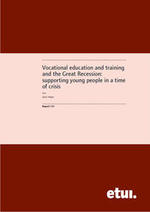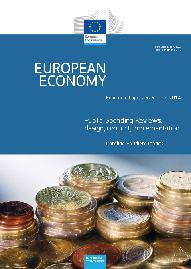Lima, B. C., Grasselli, M. R., Wang, X.-S. & Wu, J. (2013) “Destabilizing a stable crisis: Employment persistence and government intervention in macroeconomics“, Structural Change and Economic Dynamics, No. 30 (2014), pp. 30-51. The basic Keen model is a three-dimensional dynamical system describing the time evolution of the wage share, employment rate, and private debt in a closed economy. In the absence of government intervention this system admits, among …Read More
Vocational education and training and the Great Recession: supporting young people in a time of crisis
Heyes, J. (2014) “Vocational education and training and the Great Recession: supporting young people in a time of crisis“, Report 131, European Trade Union Institute (ETUI). During the last five years training and education policies have received strong support at European and international levels. Emphasis has been placed on Initial Vocational Education and Training (IVET) and apprenticeships – which enable workers to gain a foothold in the labour market …Read More
Can Investment Save Europe?
Pisani-Ferry, J. (2014) “Can Investment Save Europe?“, Project Syndicate, 30 Ιουλίου. Economic growth in Europe remains disappointing. Virtually all European Union members are expected to post higher output in 2014; but, according to the International Monetary Fund’s latest projections, the average growth rate in the eurozone will barely exceed 1%. And, whereas the British economy is displaying strong momentum, its GDP has only now surpassed the pre-crisis mark. In …Read More
Financial crises: lessons from history for today
Sayek, S. & Taskin, F. (2014) “Financial crises: lessons from history for today“, Economic Policy, Vol. 29, Issue 79, pp. 447–493. Making use of the propensity score matching method, we match earlier crises (pre-2007) with currently ongoing crises (post-2007). The old and new crises are matched in three dimensions: the global setting in which they occurred, the structure of the economy and the domestic vulnerabilities in the pre-crisis period. Our …Read More
Public Spending Reviews: design, conduct, implementation
Vandierendonck, C. (2014) “Public Spending Reviews: design, conduct, implementation“, European Economy, European Commission Economic Papers, 525, Ιούλιος: Βρυξέλλες. This paper proposes to highlight the main features and key success factors of the design, conduct and implementation of spending reviews, based on the experiences of EU Member States. Public expenditure accounts for almost half of the annual wealth created in the EU (49.0% of GDP in 2013). A major policy …Read More
The Meaning of a British Exit from the European Union
McCormick, J. (2014) “The Meaning of a British Exit from the European Union“, LSE EUROPP, 29 Ιουλίου. Since January 2013, and the announcement by British Prime Minister David Cameron of his plan to hold a referendum on continued UK membership of the European Union, there has been much speculation about the possible effects of a so-called ‘Brexit’. However, it can be no more than speculation, because no member state …Read More
Why Institutions Matter in the Eurozone
Thillaye, R., Kouba, L. & Sachs, A. (2014) “Why Institutions Matter in the Eurozone“, Policy Network Publications, 17 Ιουλίου. Reforming EU Economic Governance The debate about the Eurozone’s future usually centres on a clash between economics and politics. Giving the EU greater oversight powers and more spending capacity is said to be the only viable long run solution, but there is little popular appetite for this option. As a …Read More
What’s in a European Commission President?
Salamone, A. (2014) “What’s in a European Commission President?“, Britain’s Europe Blog, 25 Ιουλίου. The next President of the European Commission faces a number of obstacles to a successful term of office. Political and institutional challenges, ranging from the power of the Council and the Parliament to the difficulty in building unity in the Commission, stand in the way of the President’s goals for the EU. In order to …Read More
Official discussions on Greece’s 5th program review to incept in mid-September: Key items on the agenda
Petropoulou, P. (2014) “Official discussions on Greece’s 5th program review to incept in mid-September: Key items on the agenda“, Eurobank – Greece Macro Monitor, 22 Ιουλίου. This report takes a close look on a number of quantitative targets and structural benchmarks included in the agenda of the 5th review of Greece’s adjustment program, expected to commence in mid-September. It also provides an overview of the progress already made by …Read More
The Real Raw Material of Wealth
Hausmann, R. (2014) “The Real Raw Material of Wealth“, Project Syndicate, 26 Ιουλίου. Poor countries export raw materials such as cocoa, iron ore, and raw diamonds. Rich countries export – often to those same poor countries – more complex products such as chocolate, cars, and jewels. If poor countries want to get rich, they should stop exporting their resources in raw form and concentrate on adding value to them. …Read More







